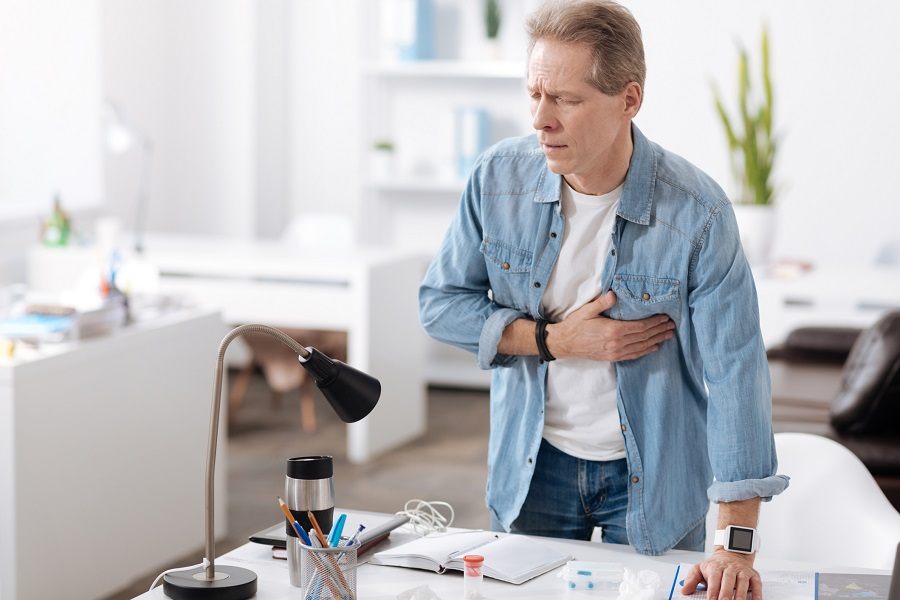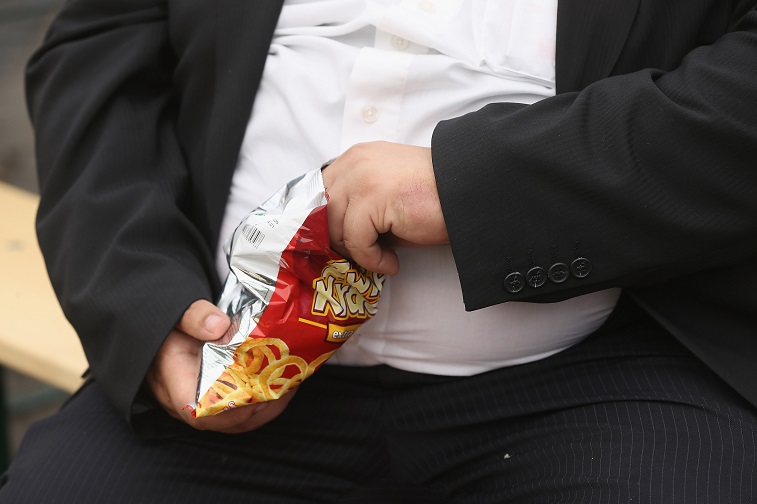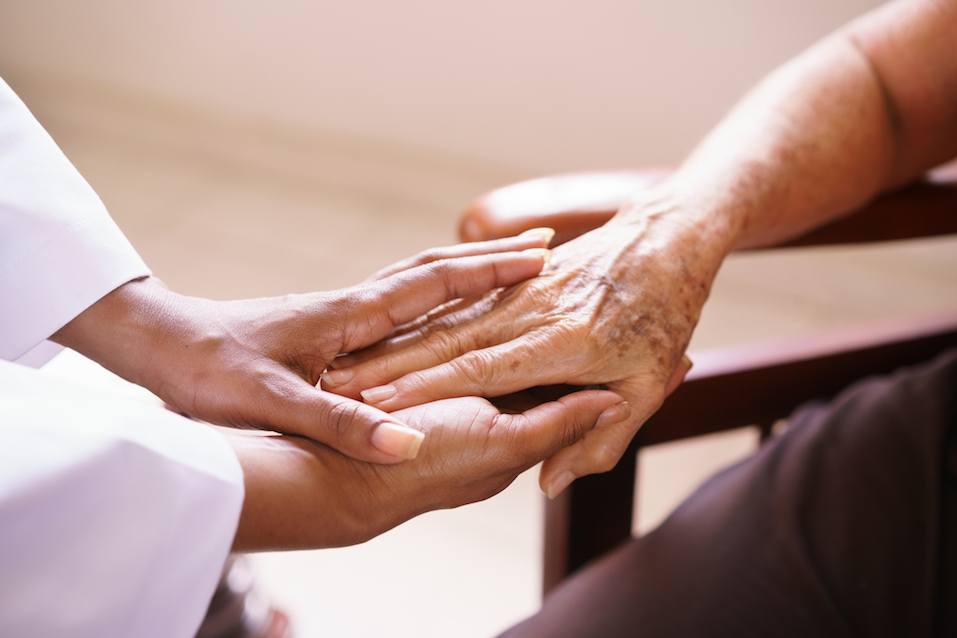We’re all going to die someday — and scarily enough, there’s no guarantee you’re going to live a long, happy life. Business Insider reports while the U.S. is getting healthier overall, 21 states are seeing a rise in death rates for folks between the ages of 20 and 55.
If the following concerns apply to you, death may arrive sooner than you’d like. For example, if your fingernails look a certain way you may die early (No. 10).
1. Your resting heart rate is above 90 beats per minute

Man holding his chest in discomfort | Zinkevych/iStock/Getty Images
- Aim for your resting heart rate to be between 60-80 beats per minute.
An analysis from the CMAJ ties a resting heart rate of more than 90 beats per minute to a significantly higher risk of death. Ideally, your resting heart rate should be somewhere between 60-80 beats per minute.
Want to lower your resting heart rate? Go for regular walks, reduce your stress levels, and quit smoking if you’re a tobacco user. Even just adding more exercise into your day can greatly impact your heart rate.
Next: Are your extremities trying to tell you something?
2. Your joints are often swollen and inflamed

Doctor showing x-ray to a patient | johnkellerman/iStock/Getty Images
- Your cells could be dying and your body may be actively deteriorating.
There are, of course, many reasons you may experience inflammation. But when cells they die, they cause an inflammatory response to try and repair the tissue. Unfortunately, this response can also result in tissue damage that can lead to many life-threatening diseases. In essence, if your joints, ligaments, or other body parts are chronically swollen, seek medical care.
3. You’re out of breath when you attempt physical activity

People run at the gym. | Halfpoint/iStock/Getty Images
- Your fitness score while running on a treadmill could better predict your mortality than your family history.
While some people are more physically inclined than others, how out of breath you get when starting an activity like running can predict your mortality. Yahoo reports researchers analyzed the results of 58,000 fitness tests and found looking at people’s heart rates while on a treadmill was a more accurate way of predicting death than looking at their family history.
4. You constantly have bad breath

Dentist repairs tooth of his female patient | iStock.com/LuckyBusiness
- Bad breath might indicate cancer or other infections that can kill you.
Of course, it may just be the garlic mashed potatoes you had for dinner, but chronic bad breath can signal serious underlying health problems.
When you first find your breath is less than ideal, the Mayo Clinic recommends making lifestyle changes like drinking more water or brushing your teeth directly after you’ve eaten. If it persists, however, head to the dentist. They’ll be able to tell you if it’s a mouth problem you’re dealing with or something a doctor should be taking care of.
5. You’re slowly losing your sense of smell

Woman smelling flowers | DeanDrobot/iStock/Getty Images
- Studies tie the loss of smell to 5-year mortality.
Our sense of smell is important, but it can fade as we age. In one study, losing the ability to smell was a biomarker in many genetic makeups that vitality was fading and death would occur within five years.
Losing your ability to smell isn’t just a sign that death may be near, either. It can also indicated that you’re developing Alzheimer’s — another disease that is always fatal.
6. You’re divorced or separated from your partner

Lonely senior woman | SuzanaMarinkovic/iStock/Getty Images
- One study showed participants who were divorced or separated had a 46% higher chance of dying.
While marriage may not always be the key to happiness for all, it turns out if you get divorced or separate from your partner, you may be on your way to an early death. The University of Arizona analyzed divorced/separated folks and married groups and found those in the divorced/separated category had a 46% greater risk of dying. This is partly because the divorced group was more likely to engage in unhealthy behaviors, like smoking and neglecting exercise.
7. Your grip strength is weak

Senior man preparing to lift a heavy weight | UberImages/iStock/Getty Images
- Your grip strength can measure your risk of heart attack or stroke.
Oddly enough, grip strength — how hard you can grasp something — can tell doctors whether there are serious underlying issues with our bodies. Harvard Health Publishing reports a study showed with each 11-pound decrease in grip strength, there was a 16% higher risk of dying from any cause. Additionally, the same decrease in strength was linked to a 17% higher risk of dying from heart disease and a 9% higher risk of dying from stroke.
8. You experience pauses in breathing when you sleep

Senior woman sleeping on bed in bedroom | Wavebreakmedia/Getty Images
- This is common with people who suffer from sleep apnea, which can lead to cardiac arrest.
If you’ve noticed changes in breathing patterns, it can be a sign that something is off, says WebMD. Specifically, if you or someone you know ceases to breathe for stretches at a time — either while awake or asleep — be warned, as this could indicated sleep apnea. As Dr. Apoor Gami tells the publication, “The presence and severity of sleep apnea are associated with a significantly increased risk of sudden cardiac death.” The rates of this condition are on the rise, too.
9. You lag behind when walking with others

Senior couple embracing | Digital Vision/Getty Images
- A slower gait is associated with issues involving your heart and lungs.
You don’t need to walk as fast as power-walkers, but pay attention if you consistently fall behind while walking with others. A slower gait is associated with an “increased risk of disability and death,” says Prevention, as this can indicate there are issues with your heart, lungs, musculoskeletal system, or circulatory system. Try improving your pace by walking for 30 minutes every day.
10. Your nails look gnarly

Having unique fingernails is not a good thing. | Fox Photos/Getty Images
- Odd-looking nails could indicate a problem like liver disease, anemia, heart disease, or a thyroid issue.
Our fingernails can tell us a whole lot about the state of our health. If your nails have spots, strange ridges, discoloration, or are seemingly falling apart, this isn’t something you should ignore. Pale-colored nails that are much paler than other areas of your skin are an indication that liver disease, anemia, or heart disease may be present. And fingernails that take on a clubbed appearance (which happens when your fingers swell and your nails grow to fit them) can also mean life-threatening kidney or liver disease is in your future.
11. You live in a certain area of the U.S.

The urban skyline of Panama city | SL_Photography/ iStock/ Getty Images Plus
- Pollution, your commute, and even natural disasters all affect your health.
Your geographic location can have a big impact on your health. If you live in certain parts of the country, for example, you may be more prone to certain cancers or cultural influences.
USA Today reports there are certain counties in the U.S. that are known for having an extremely low life expectancy. In parts of Alaska, for example, a third of all deaths occur to people who are under the age of 35.
12. You’ve broken a lot of bones

A middle-aged man in pain | iStock.com/bowdenimages
- Poor bone health can lead to life-threatening illness later on.
If you broke your arm once, you don’t necessarily need to worry. But if you’re breaking bones consistently after a certain age (say, your mid-40s) this can cascade into other issues like arthritis and limited mobility — the beginning of a downward spiral. Drinking a lot of alcohol, taking certain drugs, or having certain diseases can also increase your risk.
13. You didn’t make it past high school

Senior woman reading a book at the park | Wavebreakmedia/iStock/Getty Images
- Research shows the longer you went to school, or the higher your degree, the longer you’ll live.
Did you head to college after high school? Studies show those who have advanced degrees often have a higher quality of life, which also greatly impacts mortality. Your advanced schooling may mean you make more money and live a less stressful life, or you can afford more nutritious foods. This isn’t to say you can’t make it if you never went to college — but having that degree may make life a lot easier.
14. Your appetite or bathroom habits are changing

Pay attention to a sudden change in eating habits. | Sean Gallup/Getty Images
- Many people start eating less than normal when death is near.
Find yourself eating more or less than usual? It may indicate you won’t live much longer, says the Healthwise staff at University of Michigan. This can be a sign of changing metabolism and can play a role in other symptoms on this list, too.
Additionally, you should pay attention to your bathroom habits. Changing bowel movements can also be a sign that death may be closer than you think.
15. Your parents or grandparents passed away early

A doctor holding the hand of an older woman | iStock.com/diego_cervo
- Your genes may influence how long you live by up to 25%.
Dr. Sharad P. Paul told Prevention, “We now know that for humans, genes have a 25% influence on longevity.” The good news: Genes don’t account for 75% of the factors influencing your lifespan. You have the power to “alter the genetic hand” you’re dealt, according to many experts. And that means maintaining a healthy lifestyle is more important than ever.
Check out The Cheat Sheet on Facebook!
Additional reporting by Gina Ragusa.
Additional reporting by Lauren Weiler.
Source: Read Full Article